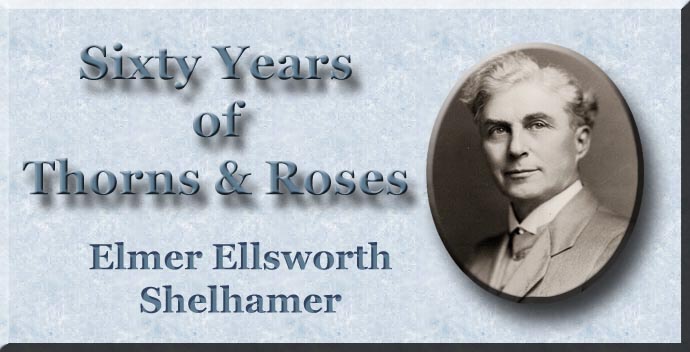
60 Years of Thorns & Roses
By Elmer Ellsworth Shelhamer
Part I
Chapter 14
THE TIDE TURNS
The experience at the Georgia camp meeting opened up the way for considerable free advertising. The "big guns" began to boom in every direction. One of the leading holiness papers in the South opened its columns for two noted writers to warn the people against the "Fanatic from Atlanta." Letters flew thick and fast to head off any openings I might receive, and of course they were successful. In addition to letters, some places were actually canvassed by holiness preachers, in order to keep me out. This continued for three years in a most refined and unrelenting manner. We were reduced at last to three cents and this with a two cent stamp bought the cheapest soup bone to be had. Wife boiled it three days. I confess the soup was a little thin the third day. About this time I received an invitation to attend an annual conference session in the southern part of the State. The president of the conference was remonstrated with for giving the invitation, whereupon he answered, "I have heard so much about that man I want to see if he has hoofs and horns: let him come." "No, but it will split this conference." "Well, if one man can split it, it ought to be split wide open." It was evident that talking was of no avail, hence some other measure must be adopted to prevent my arrival. Accordingly, a committee was appointed to meet the train and intercept me, telling me my presence was not wanted. They met the train but failed to see the fellow for whom they were looking, as they had him pictured, "about fifty years of age, heavy-set, shaggy eyebrows, chin beard, sour-looking and ready to find fault at the first little thing he saw." Instead, they saw a slender, boyish-looking fellow, and said among themselves, 'Surely that is not he; he looks too innocent and humble to hurt anybody." Lest they offend a respectable stranger they let him pass. He walked to the church where the conference was being held and was asked to preach that night. The preachers and people were on their guard watching every gesture and weighing the orthodoxy of every expression, but while so doing the Spirit was at work, and sandy foundations were being undermined. As soon as he finished, the president of the conference arose and said; "Brethren, I see under the light of the Holy Ghost that I am a backslider, and I for one am going to the altar." Others followed, and soon the place was filled with sobbing and praying. God seemed to take them by surprise and rapture the whole thing. The next day, while in a business session, the secretary of the conference arose and said, "Brethren, they say an open confession is good for the soul, and I am going to make one; some of the rest of you need to do likewise, but I will let you do your own confessing. I see clearly that I have been fighting against one of God's prophets, and by listening to everything I heard I have closed many doors against him but, by the grace of God, from this time on I will open as many as I have closed. Come up here, Brother Shelhamer!" I did so, and not only the secretary, but eight or nine preachers followed in hand-shaking, embracing and weeping. During the conference session a number of preachers and people came out into a large place. The committee related afterwards how they missed their man at the train. The secretary, who published a paper, voluntarily came out in it, as he had on the conference floor, and from that time there were more invitations than we could fill. Notwithstanding the fact that the backbone of prejudice was now broken, yet there still existed, as doubtless there always will, individual cases. One preacher frequently declared that "Shelhamer has a mesmeric power that he throws over the people." Another instance: In a series of meetings in south Georgia, some came through curiosity, a few of whom ventured to go forward at the close of the service and shake hands, thereby getting a closer view of the "monstrosity." After returning to their seats they urged one of their company, a woman, to go up and shake hands. She replied, "Never! I would not shake hands with that man for anything in the world." "Why, we did, and he is a pleasant man." "Aye, that's it. He acts meek and humble until he gets his power over you, and then you are helpless." At another place certain ones positively refused to shake hands for fear the "power" might be transmitted to them through the hand. Surely, we do not need to go back to Paul's day to find superstition and deep-seated prejudice. Nevertheless, in all this faith triumphed, and we could not have thought up anything half so interesting by which to advertise the work of God. During these years we could frequently and truthfully quote: "By evil report and good report: as deceivers and yet true; as unknown, and yet well known." 2 Cor. 6 :8, 9. |
|
 |
 |
|
|
|
-
Site Navigation
 Home
Home What's New
What's New Bible
Bible Photos
Photos Hiking
Hiking E-Books
E-Books Genealogy
Genealogy Profile
Free Plug-ins You May Need
Profile
Free Plug-ins You May Need
 Get Java
Get Java.png) Get Flash
Get Flash Get 7-Zip
Get 7-Zip Get Acrobat Reader
Get Acrobat Reader Get TheWORD
Get TheWORD